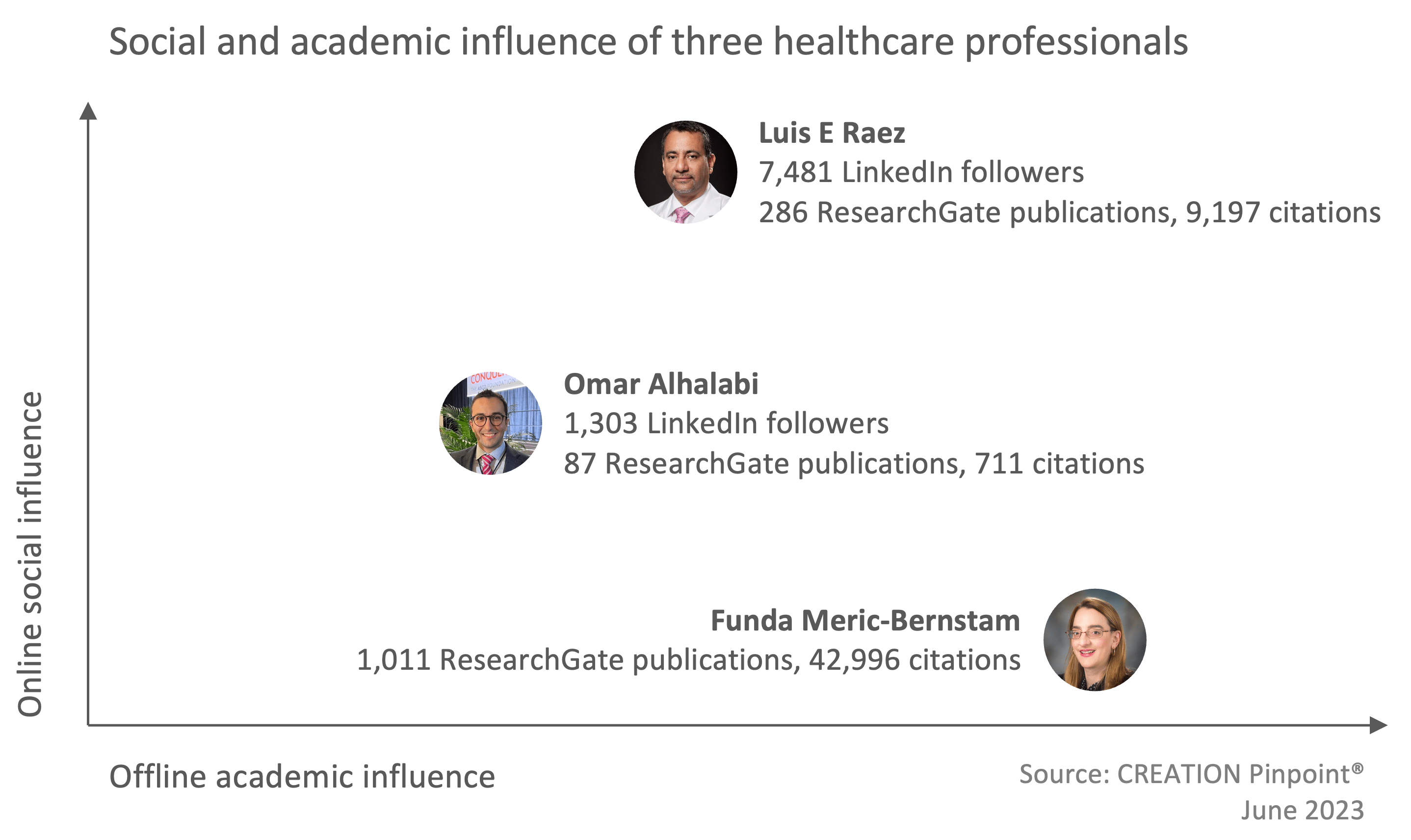20.06.2023 | Pharma 101
Are Digital Opinion Leaders just Influencers with medical qualifications?
An influencer is an individual who has the capacity to have an effect on the beliefs or behaviour of others. In the world of social media there are many reasons an individual can become an influencer. For some they have built a reputation as a knowledgeable expert on a topic, others are followed due to the opinions they express, still others have gained popularity through sheer personality, likability or relatability. Many are ‘celebrities’ who are not experts in their area of influence. Companies often work commercially with social media influencers due to their ability to create a ripple effect encouraging followers towards purchasing decisions. So, are Digital Opinion Leaders (DOLs) just medical influencers with medical qualifications?
Who are healthcare influencers?
In the healthcare setting, some influencers are celebrities without clinical or technical expertise in healthcare issues. Some have a personal connection, often via a family member or friend who is a patient.
But influencers in healthcare pre-date social media and have been called Key Opinion Leaders (KOLs) or Key External Experts; traditionally they exert their influence via medical publications and medical congresses. When some of these individuals created social media accounts they translated their offline reach into online reach. A few of these have entered the upper echelons of the digital world to become Digital Opinion Leaders (DOLs).
However, only some KOLs have become DOLs and relatively few DOLs are KOLs. It is also important to note Digital Opinion Leaders are not just KOLs with a Twitter account. Some KOLs have not made the transition into becoming DOLs because they have avoided digital engagement, while others have created social media profiles but have not used them in such a way as to gain any meaningful influence online.

Some HCP Digital Opinion Leaders have vast public followings because their personal brand has a wide reaching audience. But many influencers have followings within a distinct niche. Within this niche, the size of the following is less important than the level of engagement and the proportion of followers from the niche pool.
Considering the potential niche focus of followers and the simple definition of an influencer (a person who can influence), an HCP DOL could be considered an influencer with medical qualifications. However, there are also a number of key differences that set Digital Opinion Leaders apart from other influencers.
Digital Opinion Leaders can’t be defined only by volume of followers
Many classify influencers into ‘influencer types’ using the metric of number of followers. Typically influencer types include mega-influencers, macro-influencers, micro-influencers and nano-influencers. Definitions of the follower bands vary, but commonly mega-influencers have more than one million followers and nano-influencers less than one thousand. A very small number of HCP Digital Opinion Leaders will have more than one million followers but they certainly can have less than one thousand, a nano-influencer by most definitions. Nano-influencers can still be the most authoritative online voice in a given therapy in a select country, or even globally.
Healthcare professional Digital Opinion Leaders can be any of the influencer types from mega to nano, as size of the following is less relevant than the nature of the following network they are embedded in. When it comes to career social media influencers, often the number of followers is the be all and end all. In the world of HCP DOLs, the type of follower is most important.
In a recent analysis of the top 50 HCP Digital Opinion Leaders in type two diabetes, it was found that they had an average of 21,460 followers from 61 different countries each. The split between a DOLs’ followers that are HCP peers and the general public can differ greatly. Among these 50 diabetes DOLs the average was a little less than 1 in 10 followers being an eHCP.
DOL influence comes from peer trust not celebrity status
HCP DOLs can be celebrities, Drs Phil, Oz and Pixie McKenna spring to mind, but more often than not DOLs are thought leaders, rather than mainstream celebrities. For those who are celebrities, their medical qualification almost always will have preceded their fame. With perhaps a few exceptions, rarely is a DOLs’ influence built on only personality or amiability (most are likeable though!) but the foundation of the influence of a Digital Opinion Leader is peer trust.
Some of this peer trust will have been won through their qualifications, experience with patients, involvement in clinical research or engagement in congress and this trust needs to be re-earned online. That is done through dissemination of useful content, active engagement in peer-peer discussions, talking about topics of interest to peers, not just their own topics of interest and remaining close to scientific accuracy. Usually commitment to the value of evidence is key.
More about science and patients than money
A few HCP Digital Opinion Leaders are paid for varying levels of engagement with the healthcare industry, but very rarely are they paid to directly post specific words or say something online. The vast majority of DOLs are doing what they do for the benefit of the scientific community, the wider healthcare community and ultimately patients. A DOL is influential in the area they are passionate about, the environment where they want to be the leading voice.
🤔 @Naomi_AdjeiMD presented thought provoking data regarding uptake of upfront maintenance therapy in #OvarianCancer – understanding the disparities in use of #PARPi +/- bevacizumab is essential to improve outcomes for our patients #ASCO23 #gyncsm pic.twitter.com/xI2Khvmu8a
— Shannon Westin, MD, MPH, FASCO (@ShannonWestin) June 6, 2023
How can I identify and engage with Digital Opinion Leaders?
We’ve seen how Digital Opinion Leaders differ from mainstream influencers in a number of different ways. Therefore the way to go about associating with them would also be a distinctive proposition. Deciding how to identify, profile and engage Digital Opinion Leaders (DOLs) is a process as unique as your own goals. To avoid disappointment it is important to consider, from the start, what you really want to achieve and how DOLs could support those objectives.
Distilled from more than 100,000 hours of research into the behaviours of online health stakeholders, our beginner’s guide to DOLs webinar will help you understand how a HCP Digital Opinion Leader is identified and inspire you with ways in which you can learn from and connect with them.
To watch the webinar, click here or if you would like a more detailed discussion about how CREATION.co could help you with your Digital Opinion Leader activity, get in touch.
 By Jamie Doggett
By Jamie Doggett 
